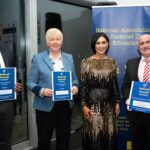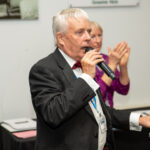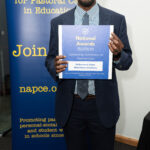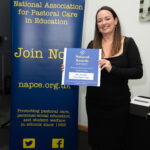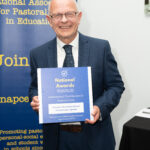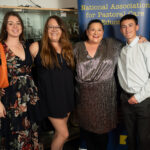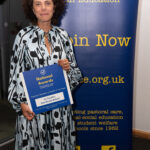The finalists of the National Awards For Pastoral Care In Education 2023 have been revealed.
Now in its fourth year, the NAPCE Awards is a firm fixture on the education calendar and nominees have been selected in eight categories by an independent panel of judges made up of educational experts.
NAPCE National Chair Phil Jones announced that the standard of entries was once again “phenomenally high” and all entrants should be “very proud” of their work.
The Awards was launched by NAPCE in 2019 and for the first time last year an busy in-person presentation ceremony took place.
The NAPCE Awards is the first UK-wide scheme to recognise outstanding achievements across pastoral care in education settings.
It was created to highlight excellent practice in pastoral care and to celebrate the people making a real difference in the educational experience of young people.
It also encourages new initiatives and ideas in pastoral care and recognises the contributions being made to developing policy and practice in pastoral support.
Mr Jones said: “The NAPCE Awards continues to go from strength to strength and I am so pleased to announce that we received a record high number of entries this year.
“I would like to offer my warmest congratulations to all finalists and to thank them for their work in the field of pastoral care over the past year.
“We had quite a number of returning nominees but also so many new schools and institutions taking part for the first time, it is very exciting indeed.
“I have to say that the standard of entry was phenomenally high and so reaching the final stages is a big achievement in itself.
“We are thrilled to be returning to Worcestershire County Cricket Ground, in Worcester for a big celebration evening in September and tickets for all finalists are FREE.
“Finally I’d like to send my very best wishes to all finalists and we look forward to meeting you later this year.”
To book tickets for the showpiece Presentation Evening on September 29th at Worcestershire County Cricket Ground, Worcester, click here: https://NAPCEawards23.eventbrite.co.uk
The Finalists
Pastoral School of The Year
(A school that can demonstrate a commitment to pastoral care and support for learners that makes a real difference in the progress and personal development of young people in the school)
Up Holland High School, Lancashire
Richard Cloudesley School
St Patrick’s College, Dungiven
RGS The Grange
Holy Trinity Primary School
…
Pastoral Team of The Year
(A team that works in pastoral care and can demonstrate a determination to support young people to achieve their full potential and a positive impact on the young people they work with)
Pastoral Team at Shireland Collegiate Academy
SENDi Team Tudor Grange Academy, Worcester
Pastoral Team, Stockport Academy
Institute of Policing’s Work Based Education Officers Team
Team of Student Managers, Preston College
…
Pastoral Member of Staff of the Year
(A member of staff who works in pastoral care and who always makes the extra effort to support young people to enable them to become effective learners and achieve success)
Matt Pont, Beck Primary School
Raymond Kelly, St Patrick’s College Dungiven
Thomas Carter Stead, NLCS Jeju
Liz Tzouliou, East Barnet School
Aine Deane, Sacred Heart PS, Derry
…
Pastoral Leader of Staff of the Year
(Has a passion for pastoral care that is shared with colleagues to inspire and motivate them to make a real difference in the lives of the young people they work with)
Donna Merry, Southend YMCA Community School
Liz Weddle, JCoSS, Barnet
Aine Deane, Sacred Heart PS, Derry
Kathryn Bates, Shireland Collegiate Academy, Smethwick
Andrew Keep, St Bees School
…
Pastoral Development of the Year
(A pastoral initiative or idea that has achieved positive outcomes and has improved the learning experience and future life chances, for young people)
Christ the King Sixth Forms
Inclusion Hub, Friern Barnet School
Leighton Park School
Louis Grammar School, Ballymena
Raymond Herron, St. Mary’s Christian Brothers Grammar School
…
Outstanding Contribution to Pastoral Care
(A person, group or organisation that has made a real difference for the benefit of young people in the area of pastoral care)
Girls on Board
Heather Tuffs, Nidderdale High School
Lads Like Us
Sacred Heart PS, Derry
Mohammed Adam, Manchester Academy
…
Raising Awareness About Pastoral Care
(An individual, group or organisation who through their actions have raised awareness about pastoral care or pastoral issues and encouraged positive improvements for the benefit of young people)
Stephen Page, All Saints Catholic College
Ellie Costello, Team Square Peg
Pastoral Care Department, Glenlola Collegiate School
Highfield and Brookham Schools
…
International Contribution to Pastoral Care
(An international school or organisation outside of the UK or an individual working in research or in an international school outside of the UK, that has promoted or delivered high quality pastoral care)
Bromsgrove International School Thailand
NLCS Jeju
Charlene Secondary School Kiryandongo Uganda
University of Malta
International School Ikast-Brande
There will also be a prize of £100 for the school or institution for the winners of each category and individuals will also be recognised for their achievements.

